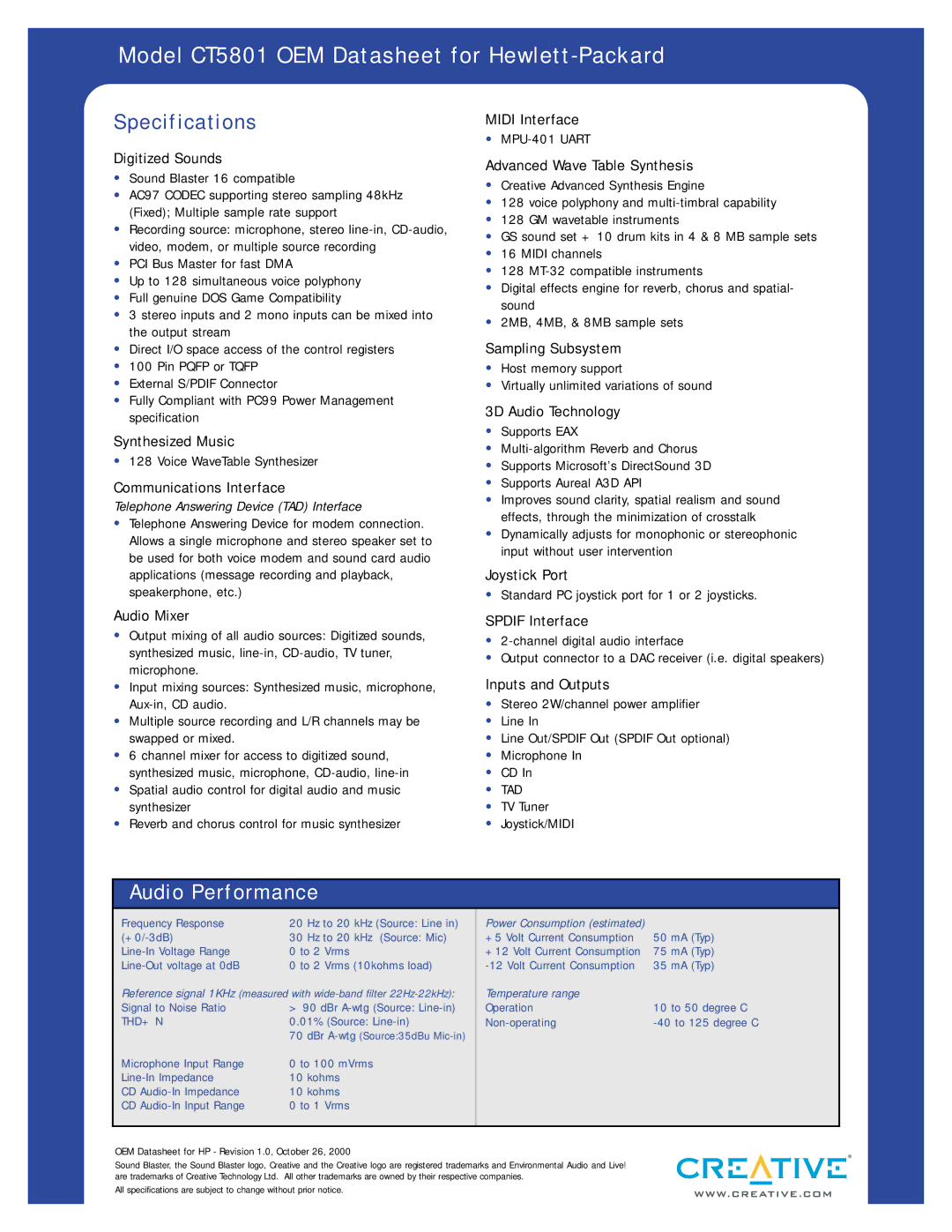
Model CT5801 OEM Datasheet for Hewlett-Packard
Specifications
Digitized Sounds
•Sound Blaster 16 compatible
•AC97 CODEC supporting stereo sampling 48kHz (Fixed); Multiple sample rate support
•Recording source: microphone, stereo
•PCI Bus Master for fast DMA
•Up to 128 simultaneous voice polyphony
•Full genuine DOS Game Compatibility
•3 stereo inputs and 2 mono inputs can be mixed into the output stream
•Direct I/O space access of the control registers
•100 Pin PQFP or TQFP
•External S/PDIF Connector
•Fully Compliant with PC99 Power Management specification
Synthesized Music
•128 Voice WaveTable Synthesizer
Communications Interface
Telephone Answering Device (TAD) Interface
•Telephone Answering Device for modem connection. Allows a single microphone and stereo speaker set to be used for both voice modem and sound card audio applications (message recording and playback, speakerphone, etc.)
Audio Mixer
•Output mixing of all audio sources: Digitized sounds, synthesized music,
•Input mixing sources: Synthesized music, microphone,
•Multiple source recording and L/R channels may be swapped or mixed.
•6 channel mixer for access to digitized sound, synthesized music, microphone,
•Spatial audio control for digital audio and music synthesizer
•Reverb and chorus control for music synthesizer
MIDI Interface
•
Advanced Wave Table Synthesis
•Creative Advanced Synthesis Engine
•128 voice polyphony and
•128 GM wavetable instruments
•GS sound set + 10 drum kits in 4 & 8 MB sample sets
•16 MIDI channels
•128
•Digital effects engine for reverb, chorus and spatial- sound
•2MB, 4MB, & 8MB sample sets
Sampling Subsystem
•Host memory support
•Virtually unlimited variations of sound
3D Audio Technology
•Supports EAX
•
•Supports Microsoft’s DirectSound 3D
•Supports Aureal A3D API
•Improves sound clarity, spatial realism and sound effects, through the minimization of crosstalk
•Dynamically adjusts for monophonic or stereophonic input without user intervention
Joystick Port
•Standard PC joystick port for 1 or 2 joysticks.
SPDIF Interface
•
•Output connector to a DAC receiver (i.e. digital speakers)
Inputs and Outputs
•Stereo 2W/channel power amplifier
•Line In
•Line Out/SPDIF Out (SPDIF Out optional)
•Microphone In
•CD In
•TAD
•TV Tuner
•Joystick/MIDI
Audio Performance
Frequency Response | 20 | Hz to 20 kHz (Source: Line in) | |
30 | Hz to 20 kHz (Source: Mic) | ||
0 to 2 | Vrms | ||
0 to 2 | Vrms (10kohms load) | ||
Reference signal 1KHz (measured with
Signal to Noise Ratio | > 90 dBr |
THD+ N | 0.01% (Source: |
| 70 dBr |
Microphone Input Range | 0 to 100 mVrms |
10 kohms | |
CD | 10 kohms |
CD | 0 to 1 Vrms |
Power Consumption (estimated) |
|
+5 Volt Current Consumption | 50 mA (Typ) |
+12 Volt Current Consumption | 75 mA (Typ) |
35 mA (Typ) | |
Temperature range |
|
Operation | 10 to 50 degree C |
|
|
OEM Datasheet for HP - Revision 1.0, October 26, 2000
Sound Blaster, the Sound Blaster logo, Creative and the Creative logo are registered trademarks and Environmental Audio and Live! are trademarks of Creative Technology Ltd. All other trademarks are owned by their respective companies.
All specifications are subject to change without prior notice.
